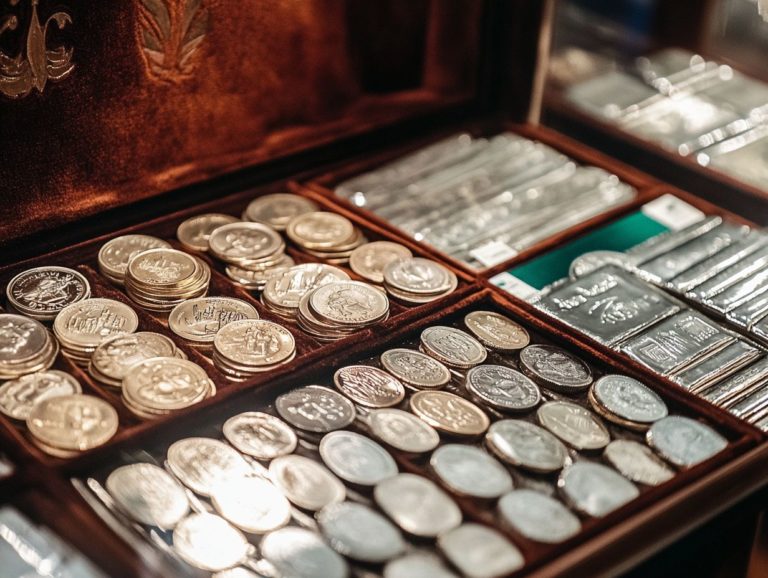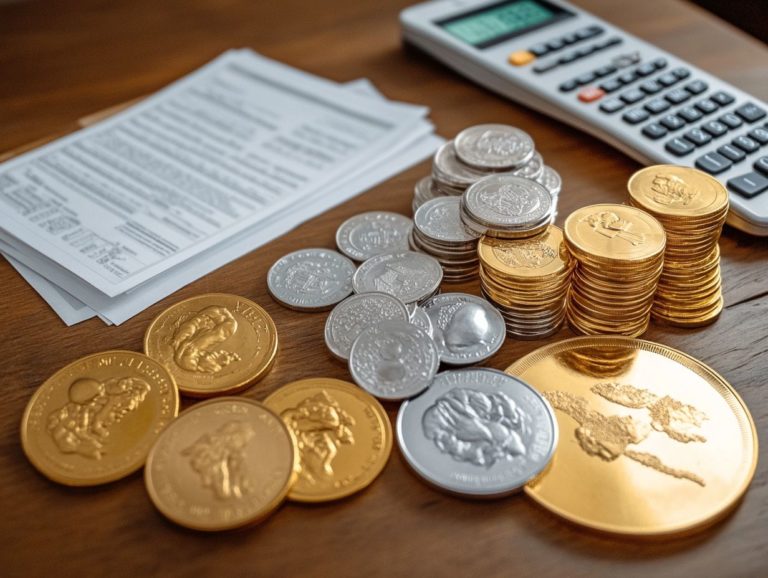How to Assess Your Tax Liability for Precious Metals
Investing in precious metals can be rewarding, but it s essential to grasp the tax implications that accompany this venture.
This article delves into the complexities of tax liability associated with precious metals. It explores everything from federal capital gains taxes to state-specific regulations. You ll be guided through the reporting requirements, sales taxes, and the precise calculations needed to determine what you owe.
Whether you re a seasoned investor or just dipping your toes into the market, grasping this information is your key to successful investing!
Contents
- Key Takeaways:
- Overview of Tax Liability for Precious Metals
- Federal Taxes on Precious Metals
- Reporting Requirements for Transactions
- State Taxes on Precious Metals
- Assessing Your Tax Liability
- Frequently Asked Questions
- How can I assess my tax liability for precious metals?
- Do I have to pay taxes on precious metals?
- What is the tax rate for precious metals?
- Are there any tax exemptions for precious metals?
- When do I have to report my precious metals for tax purposes?
- Can I deduct any expenses related to my precious metals from my taxes?
Key Takeaways:
- Know the tax laws to accurately assess your tax liability.
- Consider federal and state taxes to avoid surprises.
- Get professional help to keep your investments safe and sound!
Overview of Tax Liability for Precious Metals
Understanding your tax liability for precious metals is essential. This includes navigating aspects like capital gains tax, tax implications, and the specific regulations governing transactions involving gold, silver, platinum, and palladium. To learn more about how to handle tax liabilities for precious metals trades, it’s important to stay informed.
You need to be informed about how IRS guidelines apply to your investments. These can fluctuate based on market conditions, transaction records, and the nature of the assets. These factors play a significant role in determining your overall tax liability and the financial consequences of your investments.
Understanding Tax Laws and Regulations
Understanding the tax laws and regulations surrounding precious metals is vital for you as an investor eager to navigate the complexities of capital gains tax and follow IRS rules.
Navigating these intricate regulations is not just for compliance; it s also critical for securing your financial well-being over time. If you re dealing in gold, silver, platinum, or palladium, understand that the IRS treats these assets differently than standard stocks or bonds.
Each transaction involving precious metals can potentially trigger capital gains taxes. This means you ll need accurate reporting and thorough record-keeping.
Failing to comply with these rules could lead to severe penalties and, in some cases, costly audits. Staying informed about federal regulations is crucial for you, and consider seeking professional advice to avoid any pitfalls in this lucrative yet risky investment landscape.
Federal Taxes on Precious Metals
Federal taxes on precious metals largely focus on capital gains tax, which comes into play when you sell assets like gold coins, silver bullion, and other investment options. This tax can significantly affect your overall investment returns, so it’s essential to be aware of its implications as you navigate your investing journey.
Capital Gains Tax on Sales
Capital gains tax on the sale of precious metals is categorized into short-term and long-term capital gains, based on how long you hold the asset before selling and how its selling price compares to your original purchase cost.
This classification is crucial for determining your tax obligations. Short-term capital gains typically arise when you sell an asset held for one year or less, taxed at ordinary income tax rates the typical rates applied to regular income.
In contrast, long-term capital gains apply to assets held for more than a year, allowing you to benefit from lower tax rates. For example, if you purchase a precious metal for $1,000 and sell it for $1,500 after just six months, that $500 gain is considered short-term. However, if you hold that same asset for over a year and then sell it for the same price, your profit qualifies for the more advantageous long-term capital gains rate, which can significantly lower your tax liability. For more insights on tax strategies, consider exploring strategies for minimizing taxes on precious metals gains.
Reporting Requirements for Transactions
When you engage in transactions involving precious metals, it’s crucial to grasp the reporting requirements set forth by the IRS. Typically, this means using IRS Form 8949 and Schedule D to report your capital gains.
These forms play a pivotal role in accurately documenting your purchase and sale of assets. Keeping precise transaction records can help you evade audits and potential penalties down the road.
Keep detailed notes on every transaction. This includes dates, amounts, and the types of metals involved. As you fill out these forms, categorize each transaction correctly, distinguishing between your short-term and long-term holdings.
Understanding these requirements will make your tax experience smoother. Don t delay in getting your records in order!
State Taxes on Precious Metals
State taxes on precious metals can greatly influence your overall returns as an investor. This includes considerations like state sales tax on your purchases and income tax on any sales.
Both can differ significantly depending on your state’s regulations.
State Sales Tax on Purchases
State sales tax on precious metal purchases can vary significantly by state. This can impact your overall investment strategy as you seek to minimize tax liability.
Some states may exempt bullion from sales tax entirely. Understanding which metals qualify for exemptions, such as gold or silver coins, can greatly affect your financial outcome.
It’s wise to consider ways to follow tax laws to ensure you are adhering to state regulations while optimizing your portfolio. You may explore strategies like timing your purchases or investigating legal avenues for tax refunds.
Staying informed about these details not only helps you avoid unexpected costs but also gives you the power to make smarter investment decisions.
State Income Tax on Sales
When you’re selling precious metals, consider the implications of state income taxes. These can significantly add to your overall capital gains tax burden and influence your selling price.
Understanding the intricacies of these tax laws is crucial, as they can vary dramatically from one state to another. This could impact the financial outcomes of your sale.
Some states impose higher income tax rates. This can directly affect the effective capital gains tax rate you’ll face when liquidating your assets.
Navigating this financial landscape requires careful analysis. Keep an eye out for potential deductions and credits that might ease some of this tax burden.
Staying informed about current regulations and their implications is not just wise; it’s imperative for your financial well-being.
Assessing Your Tax Liability
When you assess your tax liability related to precious metals, it s essential to have a comprehensive grasp of the tax implications tied to your investment decisions. This includes understanding capital gains tax and exploring potential strategies to minimize your tax burden.
Calculating Taxes Owed
Calculating the taxes owed on your precious metals sales requires determining your capital gains. This is based on the cost basis the original amount paid for an asset and the fair market value at the time of sale.
To kick off this process, establish your cost basis. This includes the original purchase price along with any related expenses, such as appraisal and storage fees.
Next, by assessing the fair market value at the point of sale, you can clearly calculate your gains. It’s essential to understand how historical performance influences these values since past price trends can provide insights into future outcomes. Additionally, knowing how to keep track of tax records for precious metals is crucial for effective financial management.
Maintaining meticulous records isn t just a good habit; it s vital for accurate tax reporting. Keeping receipts and transaction histories will substantiate your claims, ensuring compliance with tax regulations and helping you avoid any potential disputes down the line.
Seeking Professional Advice
Seeking professional advice from a tax expert can offer you invaluable insights into the financial implications of investing in precious metals. This guidance helps ensure you remain compliant with IRS regulations.
This expert guidance is critical when navigating the detailed tax rules associated with such investments. A knowledgeable tax advisor can help you identify opportunities to maximize your returns by providing tailored advice specific to precious metals, including strategies for managing capital gains and potential deductions. For more information, check out this guide on how to report precious metals on your tax return.
They can work with you to develop comprehensive plans that align with your current investments and future financial aspirations, all while minimizing your tax liabilities. By leveraging their expertise, you can approach your decisions with greater confidence. This allows you to focus on growing your portfolio while staying within legal boundaries.
Frequently Asked Questions
How can I assess my tax liability for precious metals?
To assess your tax liability for precious metals, determine the current market value of your metals and calculate your capital gains or losses. This can be done with a reputable online calculator or by consulting with a tax professional.
Do I have to pay taxes on precious metals?
In most cases, yes, you will have to pay taxes on your precious metals. The type of tax and amount owed will depend on how you acquired the metals (purchase or inheritance) and how long you have held them.
What is the tax rate for precious metals?
The tax rate for precious metals can vary depending on your income level and the type of metal you own. Typically, the capital gains tax rate is between 15-28%.
Are there any tax exemptions for precious metals?
Yes, some tax exemptions exist for precious metals, such as certain coins and bars that are considered legal tender. Researching and consulting with a tax professional is important to see if your metals qualify for any exemptions.
When do I have to report my precious metals for tax purposes?
You must report your precious metals on your tax return if you have sold them or if they have increased in value since you acquired them. This typically occurs at the end of the tax year. You may also need to report them if you inherited them or received them as a gift.
Yes, you may be able to deduct certain expenses related to your precious metals, such as storage fees or transportation costs. Keep detailed records and consult with a tax professional to ensure eligibility for these deductions.
Contact a tax expert today to secure your financial future!














